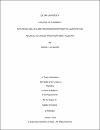Exploring Healthcare Provider Perceptions Of Narcotic Use Related To Cancer Pain Treatment In Qatar
الملخص
Purpose: The aim of this thesis to explore narcotic use for cancer patients in Qatar from health professional perspectives, in order to further understand facilitators and barriers for optimal prescribing, including any impact of culture. Methods: Eight focus groups were conducted with health care professionals (physicians, pharmacists, and nurses) purposively sampled from the National Center for Cancer Care & Research (NCCCR). An 8-question discussion guide framed discussions and targeted cultural beliefs. Focus groups were audio-recorded and transcribed verbatim. An inductive open coding technique was used to analyze transcripts for content and themes. Results: Eight physicians, sixteen pharmacists, and twelve nurses from various NCCCR care settings participated. Four major themes identified from the focus group discussions: Narcotic use process, availability of specialized care, patient-related factors, and healthcare professional related factors. Majority of participants believed narcotics have a major role in cancer pain management. Law was overwhelmingly stated as the main barrier. Family involvement and fear of opioid were commonly mentioned. Physician cultural beliefs were not perceived as a barrier by most of the participants, aside from physicians themselves. Major facilitators were specialized pain management programs and referrals to these teams, as well as patient counseling. Conclusion: Health professionals identified a multitude of facilitators and barriers perceived to influence achievement of optimal narcotic use in Qatar. These findings support the notion that narcotic utilization is not simply influenced by a single factor or subset of factors but by a multitude of factors that can be both independent and interrelated. As such, any intervention targeted to optimize the use of narcotics in any particular setting must be well researched and grounded within the local context. Future studies should explore the concept of optimal narcotic use from patient and policymaker perspectives.
DOI/handle
http://hdl.handle.net/10576/11385المجموعات
- ماجستير في الصيدلة [65 items ]


